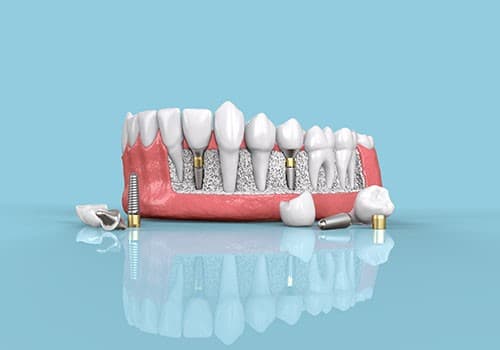If you have lost a tooth due to an accident or other reasons, you might be considering dental implants. Unlike dentures, which typically replace several or even all of your teeth, a dental implant can replace a single tooth.
The artificial tooth is permanently joined to your jawbone, usually using a titanium screw and abutment device. Today’s dental implants look almost identical to a natural tooth, and they can be an excellent option for those who are missing teeth and need this dental service.
You might be wondering whether Medicare will cover the cost of a dental implant. Keep reading to get all the details on Medicare’s dental coverage.
Does Medicare Cover Dental Implants?
So, does Medicare pay for dental implants? Unfortunately, no. Original Medicare does not cover dental implants, and It does not cover dentures.
- The Medicare laws do not allow Medicare to cover routine dental care, like cleanings, tooth extractions, fillings, crowns, or dental implants. If enrolled in Original Medicare only, you will have no dental benefits.
There are a couple of exceptions to this rule. Medicare will pay for dental services that are medically necessary as part of another procedure. For example, suppose you are in an accident requiring emergency jaw surgery. If a tooth extraction is essential for jaw surgery, then Medicare will pay for the extraction.
- Similarly, Medicare Part A will generally pay for an inpatient hospital stay that results from dental services. Suppose you undergo oral surgery and require a stay in the hospital due to the surgery.
While Medicare will not cover oral surgery, it will likely cover the hospital stay. Medicare will also cover certain oral screenings or exams that might be required for kidney surgery or heart valve replacement.
KEY TAKEAWAYS
- Original Medicare does not cover dental implants; however, if you have Part D coverage, it may cover some prescription drug costs associated with the procedure.
- Most Medicare Advantage plans have dental coverage that includes coverage for dental implants, but there is usually a cap of $1,000 to $1,500 on how much they’ll pay.
- Typical dental insurance plans (including Medicare Advantage plans) require a copay of around 20% to 40% of the cost of the procedure.
Dental Coverage With Medicare Advantage

If you have a Medicare Advantage plan, you likely have a Medicare dental plan included with your coverage. Private insurance companies manage Medicare Advantage plans, and those companies can set their own rules regarding premium amounts, coverage details, and out-of-pocket expenses.
- However, they must offer at least the same minimum level of coverage as Original Medicare.
Many people choose a Medicare Part C or Advantage insurance plan because most of these plans offer additional benefits beyond traditional Medicare coverage. These extra benefits often include vision, dental coverage, and gym memberships.
If you have a Medicare Advantage plan, you should check your plan details to determine whether dental insurance is included. Most of these plans include dental coverage, but their coverage details vary. They have different monthly premium amounts, deductibles, coinsurance amounts, and copayments.
- While your Advantage plan will likely cover your dental implant procedure, the amount you have to pay will vary depending on which plan you have.
Most Advantage plans also have an annual maximum for dental benefits. Most plans limit their yearly payout to $1,000 or $1,500. This means that they will not pay more than this amount.
So, if your procedure costs more than this, you will be responsible for the difference. You will likely also be required to pay a coinsurance amount of 20% to 40% of the procedure’s cost.
Must read articles related to Medicare
Will Medigap Help Pay For Dental Implants?
Many people choose to enroll in Medigap or Medicare supplement insurance. This insurance helps pay for out-of-pocket costs not covered by Original Medicare. These costs can include deductibles, copays, and coinsurance amounts.
However, Medigap will not pay for dental implants. Since Original Medicare does not cover dental implants, your Medigap plan will not. Medigap can only be used to pay for items covered by Medicare but requires an out-of-pocket expense.
For example, if you visit the doctor and must pay a $25 copay under your Medicare Part B coverage, your Medigap plan might cover your copay amount.
- You should also know that you cannot be enrolled in Medicare Advantage and Medigap plans. If you choose to enroll in one type of plan, you cannot also enroll in the other.
So, if you have a Medicare Advantage plan that covers dental implants, you cannot be enrolled in a Medigap plan. That means that you will still need to cover all of the out-of-pocket expenses associated with the procedure that are not paid by your Advantage plan.
TIP
Medigap is not an excellent alternative for assistance with dental expenses since it only applies to medical expenses that qualify under Original Medicare. Medicare Advantage plans with dental coverage or standalone dental insurance are better options.
Medicare Part D Coverage For Dental Medications
Some people choose to enroll in Original Medicare and add a Part D prescription drug plan, while others have a Medicare Advantage plan that includes prescription drug coverage.
- If you have a Part D drug plan, that plan will likely pay for medications that you need for your implant surgery. This includes antibiotics, pain medication, or other medicines necessary to treat your dental needs.
Medicare beneficiaries might not have dental implant coverage with their Original Medicare plan. Still, they will likely have the medications associated with this procedure covered under their Part D plan if they have one.
- As with Medicare Advantage plans, Part D plan coverage details vary from one insurance company to the next. Different plans will likely have different copays and coinsurance amounts; each plan has other information about which medications it will cover.
Consult a licensed insurance agent if you need help selecting the right Medicare plan. An agent can help you choose the right health insurance plan for your needs, which should help lower overall healthcare costs.
They can also assist you with finding dental plans that cover implants.
The Bottom Line
If you wonder, “Will Medicare pay for dental implants,” the answer is no. Original Medicare does not cover basic dentistry services like cleanings and fillings, and it also does not cover dental implants.
Some people choose to add a standalone dental insurance plan to their coverage, while others might opt for a Medicare Advantage plan that includes dental coverage. The cost of dental implants can be well over $1,000 without dental insurance, although the right dental plan can significantly lower this cost.
The replacement teeth used in today’s implants are extremely realistic, and most people could never tell that they were not natural teeth.
If you need additional coverage to help with the cost of implants, you should consider a Medicare Advantage plan or a separate dental insurance plan.
Frequently Asked Questions
A dental implant is an artificial tooth permanently attached to your jawbone. Typically, a titanium screw is inserted into the jawbone approximately where the tooth roots from the missing tooth were located.
An abutment device is then placed over the screw, and the tooth is attached to the abutment. The placement of the implant is a surgical procedure since the screw is inserted into the bone.
Today’s implants look incredibly realistic; most people find they look, feel, and act like natural teeth. Dentistry work is essential to a person’s overall medical care, and getting a dental implant can be the right decision for many people.
The average cost of a dental implant ranges from $1,500 to $5,000 for a single implant. If a bridge or other work is necessary, that cost will increase.
With dental insurance coverage, you can expect to pay approximately 40% of the cost in most cases. So, an implant is likely to cost you anywhere from $400 to $1,500 in that case.
If additional services are needed, such as additional X-rays, dental work, or other items, the procedure cost will increase.
Remember that an implant is a surgical procedure, so this includes the cost of the surgery, anesthesia, implant, and other items associated with the work.
The biggest advantage of having an implant covered by Medicare is that it will cost less money out of your pocket.
A lot of people wonder, “Does Medicare cover dental implants?” If you only have Original Medicare, you will not get an implant covered.
However, if you have a Medicare Advantage plan that includes dental coverage, your implant procedure will likely be covered. In that case, your insurance plan will cover a large portion of the cost for you.
You will only be required to pay your coinsurance amount or other out-of-pocket costs required by your plan. This can save you a significant amount of money.
You can find a Social Security Administration office near you by using our SSA office locator and searching for your closest location.





